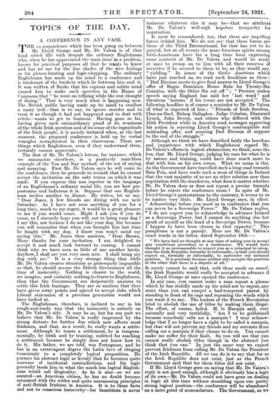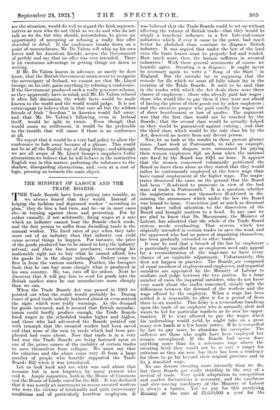TOPICS OF THE DAY.
A CONFERENCE IN ANY CASE. THE co respondence which has been going on between Mr. Lloyd George and Mr. De Valera is of that kind which fills with despair the ordinary Englishman who, when he has appreciated the main issue in a problem, knows for practical purposes all that he wants to know and has no use for the fine shades of the nice feelings or for phrase-hunting and logic-chopping. The ordinary Englishman has made up his mind to a conference and is intolerant of the bunkers which lie between him and it. It was written of Burke that his copious and subtle mind caused him to make such speeches in the House of Commons that " he went on refining while the rest thought of dining." That is very much what is happening now. The British public having made up its mind to swallow a nasty leek—that is to say, to ignore murder and to treat it as though it had not happened and to deal with rebels—wants to get to business. Having gone so far, having given such extraordinary proof of its weariness of the whole Irish question and of its sense of the ingratitude of the Irish people, it is merely irritated when, at the last moment, the proposed conference is held up by verbal wrangles metaphysical in their elusiveness. These are things which Englishmen, even if they understand them, certainly cannot appreciate. The first of Mr. De Valera's letters, for instance, which we summarize elsewhere, is a positively matchless example of the Yea and Nay method, of the art of saying and unsaying. First Mr. De Valera says he will come to the conference, then he proceeds to remark that he cannot accept the invitation on the only terms on which it was made. If you express this non sequitur in the language of an Englishman's ordinary social life, you see how pre- posterous and ludicrous it is. Suppose that one English- man invites another to dinner. He writes, let us say, " Dear Jones, A few friends are dining with me next Saturday. As I have not seen anything of you for a long time, much to my regret, it would be a great pleasure to me if you would come. Might I ask you if you do come, as I sincerely hope you will, not to bring your dog ? I say this, not because I do not like your dog, but because you will remember that when you brought him last time he fought with my dog. I know you won't mind my saying this." Mr. Jones then answers, " Dear Brown, Many thanks for your invitation. I am delighted to accept it and much look forward to coming. I cannot think why we have seen so little of one another lately. Anyhow, I shall see you very soon now. I shall bring my dog with me." It is a very strange thing that while Mr. De Valera creates situations as grotesquely impossible as that, he should accuse the British Government all the time of insincerity. Nothing is clearer to the world, we imagine, and certainly nothing is clearer to Englishmen, than that the Government are desperately anxious to settle this Irish business. They are so anxious that they have given away points and agreed to accept risks which Liberal statesmen of a previous generation would not have looked at.
The Englishman, therefore, is inclined to say in his rough-and-ready way that the insincerity is entirely on Mr: De Valera's side. It may be so, but for our part we believe that Mr. De Valera is really impressed by the strong distaste for further war which now affects most Irishmen, and that, as a result, he really wants a settle- ment. Although he wants a settlement, he is tempera- mentally, by birth and by training, unfitted for reaching a settlement because he simply does not know how to do it. His father, we are told, was Portuguese, and he has in an extravagant degree the Latin love of clinging tenaciously to a completely logical proposition. He pursues his abstract logic so keenly that he becomes quite unaware of incidental contradictions, and his logic generally lands him in what the much less logical English- man would call illogicality. As he is also—so we are assured—an American citizen, he has no doubt become saturated with the wilder and quite unreasoning principles of anti-British Irishism in America. It is to these facts tnd not to conscious insincerity—for fanaticism is never insincere whatever else it may be—that we attribute Mr. De Valera's well-nigh hopeless incapacity for negotiation.
It must be remembered, too, that there are impelling forces behind him. We do not say that these forces are those of the Third International, for that has yet to be proved, but at all events the more ferocious spirits among Irish-Americans have for a long time been expressing some mistrust of Mr. De Valera and would be ready at once to swoop on to him with all their reserves of invective if he seemed to them to be, as they would say, " yielding." In issues of the Gaelic American which have just reached us, we read such headlines as these : " Dail Eireann meets to give final answer to Lloyd George's offer of Bogus Dominion Home Rule for Twenty-Six Counties, with the Other Six cut off " ; " Premier makes speech saying England has said her ' last word ' and threatens horrors' if his terms are not accepted." The following headline is of course a reminder to Mr. De Valera of what is expected of him : " Friends of Irish freedom, Clan-na-Gael, Bishop Gallagher, Judge Cohalan, Diarmuid Lynch, John Devoy, and others who differed with the Irish President while in America send messages approving his action in rejecting Lloyd George's contemptible and misleading offer, and assuring Dail Eireann of support to the end of the struggle."
Although we think we have described fairly the boredom and impatience with which Englishmen regard Mr. De Valera's efforts in logical abstraction, we think, none the less, that Mr. Lloyd George, judging his man for what he is by nature and training, could have done much more to deal with him on his own terms. What we mean is this. As the Government have travelled such a long road towards Sinn Fein, and have made such a mess of things in Ireland that the vast majority of us see no other solution now than negotiation with the murderers, what does it matter whether Mr. De Valera does or does not repeat a precise formula before he enters the conference room ? In spite of Mr. Lloyd George's protestations to the contrary, it seems to us to matter very little. Mr. Lloyd George says, in effect, " Acknowledge before you meet us in conference that you can never be a Sovereign Power." Mr. De Valera replies, ' I do not expect you to acknowledge in advance Ireland as a Sovereign Power, but I cannot do anything else but speak of myself as the head of a Sovereign Power, because I happen to have been chosen in that capacity." This paraphrase is not a parody. Here are Mr. De Valera's exact words in his letter, dated September 19th :— " We have had no thought at any time of asking you to accep5 any conditions precedent to a conference. We would have thought it as unreasonable to expect you as a principal to recog- nize the Irish Republic, formally or informally, 418 that you should expect us, formally or informally, to surrender our national position. It is precisely because neither side accepts the position of the other that there is a dispute at all."
It surely cannot be said that, with those words on record, the Irish Republic would really be accepted in advance if Mr. Lloyd George at once opened the conference.
In any case, you cannot make a man repeat a phrase which he has stolidly made up his mind not to repeat, any more than you can compel a bad-tempered parrot by standing in front of its cage and repeating the words which you want it to say. The leaders of the French Revolution tried to abolish the use of titles by making them illegal. The effort, of course, failed. M. le Marquis said, very naturally and very truthfully, " Am I to be guillotined because somebody calls me a marquis ? I may acknow- ledge that I no longer have a right to be called a marquis, but that will not prevent my friends and my servants from calling me a marquis if they choose to do so. You cannot make me suffer for their fault. So you will see that you cannot really abolish titles though in the abstract you think that you can." In just the same way we cannot prevent Irishmen from calling Mr. De Valera the President of the Irish Republic. All we can do is to say that for us the Irish Republic does not exist, just as the French Government said that for them titles did not exist.
If Mr. Lloyd George goes on saying that Mr. De Valera's reply is not good enough, although it obviously has a logic of its own—Mr. De Valera could not have gone on dealing in logic all this time without stumbling upon one pretty strong logical position—the conference will be abandoned on a mere point of nomenclature. The Government, as ifb see the situation, would do well to regard the Irish represen- tatives as men who do not think as we do and who do not talk as we do, but who should, nevertheless, be given an opportunity of accepting or refusing a really fine offer described in detail. If the conference breaks down on a point of nomenclature, Mr. De Valera will whip up his own forces and his American friends, accuse the Government of perfidy and say that no offer was ever intended. There is an enormous advantage in getting things set down in writing.
If Mr. De Valera knows in advance, as surely he does know, that the British Government mean never to recognize the sovereignty of Ireland, we cannot see that Mr. Lloyd George, on his side, gains anything by refusing a conference. If the Government produced such a really generous scheme, as they apparently have in mind, and Mr. Dc Valera refused it after full discussion, the whole facts would be made known to the world and the world would judge. It is not extravagant to believe that in that case all but the wildest• friends of Irish " freedom " in America would fall away, and that Mr. De Valera's following, even in Ireland itself, would be split in twain. Even though that would mean no settlement, it would be far preferable to the trouble that will ensue if there is no conference at all.
We repeat that it would be a very bad policy to allow the conference to fade away because of a phrase. This would not be at all the English way of doing things ; and although we are all aware of Mr. Lloyd George's impulsive Celtic aberrations,we believe that he will behave in the instinctive English way in this matter, preferring the substance to the shadow, disregarding abstractions, and, even at a cost of logic, pressing on towards the main object.



































 Previous page
Previous page